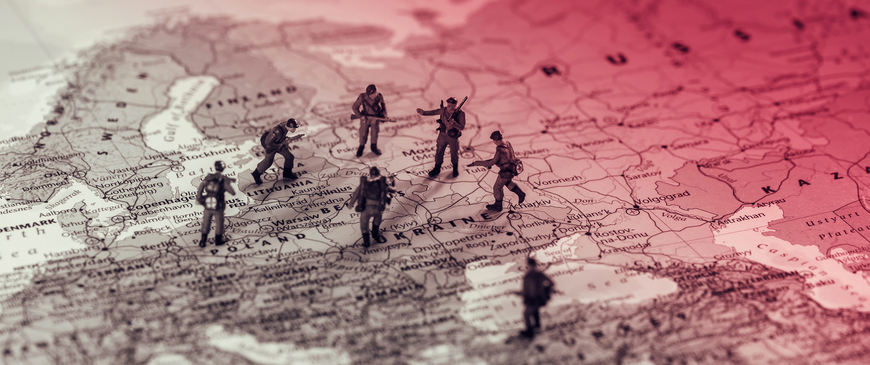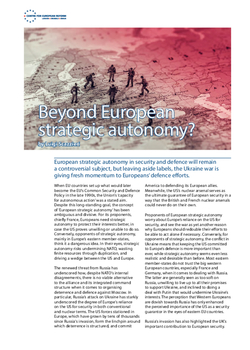
Beyond European strategic autonomy?
European strategic autonomy in security and defence will remain a controversial subject, but leaving aside labels, the Ukraine war is giving fresh momentum to Europeans’ defence efforts.
When EU countries set up what would later become the EU’s Common Security and Defence Policy in the late 1990s, the Union's ‘capacity for autonomous action’ was a stated aim. Despite this long-standing goal, the concept of ‘European strategic autonomy’ has been ambiguous and divisive. For its proponents, chiefly France, Europeans need strategic autonomy to protect their interests better, in case the US proves unwilling or unable to do so. Conversely, opponents of strategic autonomy, mainly in Europe’s eastern member-states, think it a dangerous idea. In their eyes, strategic autonomy risks undermining NATO, wasting finite resources through duplication, and driving a wedge between the US and Europe.
The renewed threat from Russia has underscored how, despite NATO’s internal disagreements, there is no viable alternative to the alliance and its integrated command structure when it comes to organising deterrence and defence against Moscow. In particular, Russia’s attack on Ukraine has starkly underscored the degree of Europe’s reliance on the US for security in both conventional and nuclear terms. The US forces stationed in Europe, which have grown by tens of thousands since Russia's invasion, form the linchpin around which deterrence is structured, and commit America to defending its European allies. Meanwhile, the US’s nuclear arsenal serves as the ultimate guarantee of European security in a way that the British and French nuclear arsenals could never do on their own.
Russia’s attack on Ukraine has starkly underscored the degree of Europe’s reliance on the US for security in both conventional and nuclear terms.
Proponents of European strategic autonomy worry about Europe’s reliance on the US for security, and see the war as yet another reason why Europeans should redouble their efforts to be able to act alone if necessary. Conversely, for opponents of strategic autonomy, the conflict in Ukraine means that keeping the US committed to Europe’s defence is more important than ever, while strategic autonomy seems even less realistic and desirable than before. Most eastern member-states do not trust the big western European countries, especially France and Germany, when it comes to dealing with Russia. The latter are generally seen as too soft on Russia, unwilling to live up to all their promises to support Ukraine, and inclined to doing a deal with Putin that would undermine Ukraine’s interests. The perception that Western Europeans are dovish towards Russia has only enhanced the perceived importance of the US as a security guarantor in the eyes of eastern EU countries.
Russia’s invasion has also highlighted the UK’s important contribution to European security. London’s hawkish stance has earned it praise amongst eastern member-states, further challenging the idea that EU-only strategic autonomy is desirable.
All this means that the debate around European strategic autonomy is set to remain contentious. But if one looks past the rhetoric, the reality is that Europeans have been making slow but steady progress in being able to look after their own security better – however they wish to label these efforts. The EU has taken on an increasingly large role in security in the past five years. This shift was prompted by conflicts and instability amongst Europe’s neighbours and by President Trump questioning the US commitment to NATO. At the same time, Brexit removed the UK’s veto on greater defence co-operation. The Union has launched the European Defence Fund to help finance co-operative research in defence. The EU also activated Permanent Structured Co-operation, a framework within which nearly all EU states are working together on a range of defence projects, such as upgrading infrastructure to ease physical and regulatory obstacles to moving military forces quickly across Europe. The aim of the EU’s Strategic Compass, a strategy document approved by all member-states in in March this year, is to “enhance the EU’s strategic autonomy”. The Compass contains proposals to strengthen joint development of military capabilities, counter hybrid and cyber threats, and assist partners. It also led to member-states agreeing to set up a 5,000-strong rapid intervention force, which implies that they would have a larger pool of interoperable forces available to deploy.
The conflict in Ukraine is pushing Europeans to take defence more seriously. Since the start of the war, EU countries have announced around €200 billion of defence spending increases. Most notably Germany has promised to raise its defence budget to 2 per cent of GDP (after years of stalling) and agreed a €100 billion ad-hoc fund to help reach that goal. The Union is leading in helping member-states to deal with the economic consequences of the conflict, especially in weaning themselves off Russian hydrocarbons. The EU is also involved in supporting Ukraine militarily: the decision to allocate €2.5 billion to finance the provision of military assistance to Kyiv through the recently launched European Peace Facility is a step change in European support for partners, and has set a precedent that is likely to be repeated in the future. The European Commission wants to co-ordinate efforts to replenish stocks of weapons given to Ukraine. The Commission has also tabled proposals to foster joint procurement and maintenance of military equipment, to generate economies of scale, by allowing member-states to form groupings that would be exempt from VAT, and by contributing EU funds to these efforts.
Time will tell whether Europeans’ newfound seriousness on defence will amount to much. Diverging national and industrial interests may torpedo the EU’s new defence initiatives, as they have done before. And announcements of additional spending by member-states are not the same thing as better capabilities. Some governments may not stump up all the money they promised; the real value of that cash will decrease if inflation remains high; and spending increases may be diluted across years. Still, there are reasons to be optimistic. First, even if the EU’s efforts to increase co-operation by providing financial incentives are not very successful, the aggregate increase in member-states' defence spending should ease resource constraints, provide more room for co-operative projects that generate economies of scale, and lead to stronger European military capabilities in the medium term. Second, the financial sweeteners on offer are substantial, and the US says it backs the EU’s defence efforts, so long as these lead to concrete results in terms of improved European capabilities. The chances of success will be greater if leaders do not use the term ‘strategic autonomy’ – France now prefers to talk of ‘European sovereignty’ – and if EU defence initiatives are as open as possible to the participation of non-EU NATO allies.
External pressure on Europeans to take defence more seriously is unlikely to decrease. The war in Ukraine will exacerbate challenges for European security.
The external pressure on Europeans to take defence more seriously is unlikely to decrease. On the one hand, Russia’s invasion will exacerbate challenges for Euro-Atlantic security well beyond Eastern Europe, with potential food shortages and economic challenges in much of Europe’s neighbourhood. On the other, the war has not undermined Washington’s bipartisan wish to focus on countering China’s rise. If Trump or another ‘America-first’ Republican became president in 2025, America’s commitment to European security could not be taken for granted, and US foreign policy could often clash with that of many EU members, undermining European security. Regardless of the outcome of the next US election, the US is likely to devote fewer resources to European security in the future, and to demand that Europeans take up a larger share of the burden of deterring Russia and stabilising their own neighbourhood. Europeans would be wise to prepare for that now.
Luigi Scazzieri is a senior research fellow at the Centre for European Reform.

